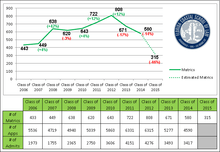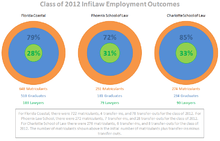InfiLaw System
| Private | |
| Industry | Educational services |
| Founded | July 28, 2006, Wilmington, Delaware |
| Headquarters | Naples, Florida, United States |
Area served | United States |
Key people |
|
| Website |
www |
The InfiLaw System is a for-profit consortium of three, ABA-accredited independent law schools in the United States, consisting of Arizona Summit Law School in Phoenix, Arizona, Charlotte School of Law, and Florida Coastal School of Law in Jacksonville, Florida. It is owned by Sterling Partners, a Chicago-based private equity firm,[1] and is headquartered in Naples, Florida.[2]
History
Founding and initial growth
Sterling Partners purchased Florida Coastal School of Law in 2004 and founded the InfiLaw System in concurrence with the purchase. InfiLaw then established the Phoenix School of Law later in 2004 and the Charlotte School of Law in 2006.[1] In November 2013, the Phoenix School of Law officially changed its name to "Arizona Summit School of Law."[3] Enrollment at each of the three schools increased drastically in the early years of InfiLaw ownership. For instance, Florida Coastal School of Law (the only previously established school in the InfiLaw System), increased from 904 students in 2004 to 1,741 students in 2010. The Arizona Summit School of Law had 336 students in 2008[4] which increased to around 700 by 2010 and necessitated a new, larger downtown Phoenix campus. The new campus provided space for an additional 350 students by 2012.[5] The Charlotte School of Law's first class in 2007 received 1,010 applicants, of which around 420 were accepted. Fewer than half of the accepted applicants sent in seat deposits. The initial class size at the Charlotte school was only around 85 students.[2] By 2009, that number had grown to 481, and, in 2011, it increased again to 1,151.[4]

As part of the law school reform movement that occurred in and around 2010 and 2011, the American Bar Association began amending its Section of Legal Education and Admissions to increase transparency at ABA-accredited schools. Among these reforms was the requirement that law schools provide more detailed and complete information about employment outcomes for graduates. This led to an overall decline in law school applications that also affected the schools in the InfiLaw System. From 2010 to 2014, law school applications dropped from 88,000 to 55,000 across the pantheon of ABA-accredited schools. InfiLaw's schools saw a similar decline in that time period from 12,754 applications in 2010 to 8,066 applications in 2013.[4]
Attempted purchase of Charleston School of Law
In August 2013, two of the three owners of the for-profit Charleston School of Law announced they were selling the school to InfiLaw. Faculty, students, and alumni voiced objections to the sale citing concerns that InfiLaw would lower admissions standards to boost enrollment, resulting in lower bar passage and employment rates, which would, in turn, damage the school's reputation.[6] Despite the opposition, others have pointed out that InfiLaw's schools have produced statistics similar to the Charleston School of Law in regard to tuition, loan default rates, employment outcomes, salaries, and passage of the bar. Two Charleston alumni wrote an op-ed in support of the sale of the school to InfiLaw, stating that InfiLaw gave the school a better chance to "thrive" and avoid struggles. In May 2014, however, a committee of the South Carolina Commission on Higher Education recommended in a 3-to-1 vote that the state's higher education regulator reject the sale.[7]
Operation and statistics
Admissions selectivity
From the outset, InfiLaw has had a stated goal of offering law school education to traditionally under-served communities. In fact, in 2007, Florida Coastal School of Law was the only law school in the nation in which students from a minority group outperformed students in non-minority groups on the bar exam.[2] InfiLaw also targets individuals who do not have high enough LSAT scores and GPAs to be admitted into higher-tier law schools.[1] InfiLaw officials have stated that the LSAT "is not the best determinant of success as a lawyer and clearly has racial bias." They offer an alternative option (dubbed "AAMPLE") in which prospective students must pass two classes prior to admission.[4] InfiLaw schools are said to provide more "hands-on learning" for individuals who score lower marks on their LSATs, offering around 400 hours of on-the-job training.[1]

In 2010, the average LSAT score for all three InfiLaw schools was either 149 or 150, a mark generally considered average. By 2013, the median LSAT score at InfiLaw schools had dropped to 144 (23rd percentile), with 25% of its students achieving marks at or below 141 (15th percentile).[4] The median GPA for the class of 2016 at Florida Coastal School of Law is 2.97[8] and is 2.88 for Arizona Summit.[9] At Charlotte, the median GPA is 2.91.[10]
InfiLaw has also received criticism for their admissions standards. Paul Campos, a University of Colorado Law School professor, suggested that lower median LSAT scores and GPAs could lead to fewer students passing the bar exam, drastically reducing employment opportunities after graduation.[4] Others have suggested that the InfiLaw System targets under-performing prospective students in order to turn a profit. A spokesperson for InfiLaw has called that assertion "baseless."[6]
Although admissions standards have been described as "lax," a 2012 report showed that 18% of first-year students at Arizona Summit had transferred to other law schools. This led to a policy in which transfer students were required to meet with an adviser before their transcripts would be released. In 2013, two professors filed a lawsuit against the school, alleging that they had been fired for objecting to the new policy (among other policy changes).[11] United States federal judge, Susan Bolton, dismissed the original complaint, but allowed the complaint to be amended in 2014. As of March 2014, Bolton appeared to be reviewing a motion to dismiss the amended complaint.[12]
Bar-passage rates
In the summer of 2013, each of the three schools in the InfiLaw system posted bar-passage rates of 58% or above. Charlotte achieved a 58% passage rate while Florida Coastal earned a 67.4% passage rate. A student from Arizona Summit posted the highest score on the Arizona bar exam in 2013.[13] When InfiLaw first took over Florida Coastal, they improved their bar-passage rate from 58.2% to 76.4%.[7] In February 2014, 73% of Florida Coastal students passed the bar and 75% passed the bar in the summer of 2012.[14]
Employment outcomes

According to official ABA-required disclosures, 36% of 2013 graduates from InfiLaw schools obtained full-time, long-term, JD-required employment within nine months of graduation. The percentage of 2013 graduates from Florida Coastal, Charlotte, and Arizona Summit who obtained full-time, long-term, JD-required employment within nine months of graduation is 29.5%, 30.3%, and 40.5%, respectively.[8][9][10]
In 2012, a group of former Florida Coastal students filed a lawsuit against the college, alleging that the school had inflated their post-graduate employment numbers in promotional material. The suit alleges that the school advertised an 80 to 95% employment rate for graduates in the first 9 months after receiving their diplomas. Lawyers for the school have suggested that they complied with all of the American Bar Association's requirements.[15] According to Florida Coastal's official 2013 ABA-required disclosures, 29.5% of the class of 2013 found full-time, long-term, JD-required employment nine months after graduation.[8] Other sources have suggested that 69% of Florida Coastal's most recent class of graduates had found employment.[14] In total, around 75% of InfiLaw graduates secure employment 9 months after graduation, although many of these jobs are temporary.[4]
Tuition and costs
Tuition and costs at Charlotte School of Law initially started out at around $27,000 per student in 2007[2] with similar rates at the other two InfiLaw schools.[7] As of 2014, median tuition costs for all three InfiLaw schools are generally around $40,000.[1][6] That being said, a projection by Law School Transparency estimated that the cost of attendance due at graduation at Florida Coastal, Charlotte School of Law, and Arizona Summit is $246,459, $239,308, and $243,864, respectively.[8][9][10] These tuition fees have traditionally led to a great deal of debt for InfiLaw students. In fact, U.S. News & World Report noted in 2014 that Florida Coastal had the lowest salary-to-debt ratio in the U.S.[16] According to Harvard Law School, 97% of Arizona Summit's graduates have debt that averages around $162,000. 92% of Florida Coastal graduates incurred an average of $143,000 in debt, while 90% of Charlotte graduates incurred an average of $115,000 in debt. Charlotte's debt statistics are in line with comparable law schools across the nation.[13]
References
- ↑ 1.0 1.1 1.2 1.3 1.4 Warren, Zach (21 October 2013). "For-profit law schools on the rise". Inside Counsel Magazine. Retrieved 20 October 2014.
- ↑ 2.0 2.1 2.2 2.3 Clary, Ellison (January 2007). "Charlotte’s New Legal Beagle". Greater Charlotte Biz. Retrieved 20 October 2014.
- ↑ Scott, Eugene (3 November 2013). "Phoenix School of Law to adopt new name". The Arizona Republic. Retrieved 20 October 2014.
- ↑ 4.0 4.1 4.2 4.3 4.4 4.5 4.6 Campos, Paul (September 2014). "The Law-School Scam". The Atlantic. Retrieved 20 October 2014.
- ↑ Gersema, Emily (27 April 2011). "For-profit Phoenix School of Law plans to move downtown". The Arizona Republic. Retrieved 20 October 2014.
- ↑ 6.0 6.1 6.2 Jones, Ashby (20 October 2013). "Private-Equity Group's for-Profit Law School Plan Draws Critics". The Wall Street Journal. Retrieved 20 October 2014.
- ↑ 7.0 7.1 7.2 Davidoff Solomon, Steven (3 June 2014). "Potential Sale of Law School Raises Debate Over Who Should Profit". The New York Times. Retrieved 20 October 2014.
- ↑ 8.0 8.1 8.2 8.3 "Florida Coastal School of Law Profile". Law School Transparency. Retrieved 20 August 2014.
- ↑ 9.0 9.1 9.2 "Arizona Summit Law School Profile". Law School Transparency. Retrieved 20 August 2014.
- ↑ 10.0 10.1 10.2 "Charlotte School of Law Profile". Law School Transparency. Retrieved 20 August 2014.
- ↑ Cassens Weiss, Debra (4 June 2013). "Suit claims law profs were fired after opposing proposals to discourage student transfers". ABA Journal. Retrieved 20 October 2014.
- ↑ "Amended Lawsuit Against Phoenix School of Law by Former Profs". Arizona Common Law. 12 March 2014. Retrieved 20 October 2014.
- ↑ 13.0 13.1 Reilly, Amanda (3 December 2013). "For-Profit Law Schools: Impacting the Future of Legal Education". The Case Studies Blog at Harvard Law School. Retrieved 20 October 2014.
- ↑ 14.0 14.1 Pantazi, Andrew (24 September 2014). "Florida Coastal School of Law graduates finish second-to-last in passing the Bar". The Florida Times-Union. Retrieved 20 October 2014.
- ↑ Browning, William (7 March 2012). "Florida Coastal School of Law grads file suit against school, allege deceptive practices". The Florida Times-Union. Retrieved 20 October 2014.
- ↑ Smith-Barrow, Delece (2 June 2014). "10 Law Schools Where Salaries for Grads Most Outweigh Debt". U.S. News & World Report. Retrieved 20 October 2014.